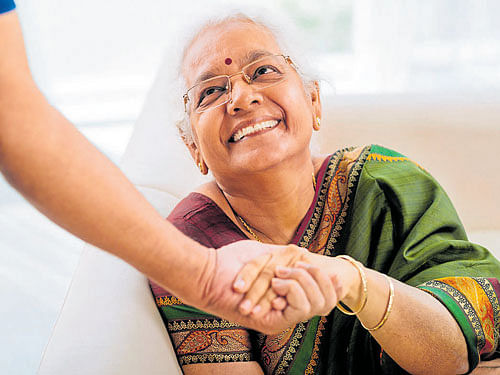
Having an elderly person at home can be a wonderful thing, for they are never short of stories that would make your jaw drop. Their advice about life and happiness is worth its weight in gold and their mere existence is a source of warmth and comfort for many.
While there is a lot to gain from our parents and grandparents, we must remember that as they age, their needs change. Compared to an average adult, an elderly person needs far more emotional support.
And it becomes our duty to help them cope with negative emotions like loneliness, helplessness and boredom. Here are things one needs to keep in mind while sharing a home with a senior citizen.
Security: Being more vulnerable than an average adult, most seniors live under constant anxiety regarding their safety. It is important that you provide them a sense of security and assure them that their living environment is safe at all times.
Attention: The elderly, like young children, need constant attention because of their inability to cope with the pace of the real world. Spend time with them because their happiness depends on their sense of self-worth, which comes with attention.
Autonomy & control: Even as you are willing to assist them with every task, most elders would still want some autonomy or control over their lives. It is essential to let them do things that they are capable of doing by themselves.
Emotional connection: Some elders tend to break off all emotional contact with people in their immediate surroundings because of lack of a sense of self-worth. Caregivers should take initiative to rekindle an emotional relationship with them by striking up a conversation and making them feel wanted.
Eliminating guilt: Seniors living with their children, especially in a financially dependent state, tend to harbour feelings of guilt. They feel they are intruding on the lives of their children.
Similarly, those taking care of their elderly dependents sometimes feel guilty that they are not able to provide them the sort of care that they would want to. In such situations, it is important talk to each other and make the elderly person understand that such feelings are unnecessary and that you are with them as long as they need.
Feeling of belonging: Elders who are active within a community tend to be happier and more satisfied with their lives than those who aren’t. This is because a community provides them a sense of belonging. Look for senior citizen communities in your locality and sign up your elderly dependant after getting their permission.
Friendship and intimacy: Like young adults, even the elderly need friendship and intimacy to lead a fulfilling life. Always give them a chance to make new friends or even love interests (if they are willing) by taking them to places where other people of their age socialise.
Privacy: Elders would still want some level of privacy in their lives. Respect that and create an environment where they feel safe.
Sense of competence: With age, sustaining the sense of competence that the elderly once had in their youth becomes difficult. Remind your dependant of their accomplishments and boost their confidence.
Purpose to life: It is very easy for an elderly person to lose faith and feel that there is no purpose to their life. The caregiver should look for signs of such feelings and depression and make them understand that there are always things to look forward to and new, positive experiences on the horizon.
Have empathy
Don’t assume that they can’t understand you. It is only natural that as a person ages, some of their physical senses might not be as efficient as they once were. Get them fitted with supporting equipment such as a hearing aid or spectacles and continue to nurture the relationship you have shared with them all your life.
Have patience during conversations. An elderly person usually needs more time to respond than an average adult. If you ask them a question and they take some time to answer, let it be. Be patient and understand that their brain functioning needs time.
Elderly are often more fatigued. Do not blame them for being lazy: it’s just that their body is weak. It could also be the side-effects of some medication. Consult their doctor and check if this is normal. You can also reduce fatigue by introducing your elderly dependent to some physical activity.
What you must make time for
Our senior family members grew up and lived in a different world. For them, emotional satisfaction came from the smaller things in life and they would still value such activities immensely. Here are things you could make time for to make them happy:
Unhurried phone calls or visits with time to listen and talk.
Lunch or dinner at their favourite restaurant.
Small treats such as flowers or their favourite snacks.
Transportation to visit family, friends or religious places.
Visits to public places such as parks and beaches.
Drives and shopping to select their own food or clothing.
If visually impaired, getting and reading to them greeting cards, books or newspaper.
Comfortable chair in front of the TV for them to watch their favourite shows.
Deccan Herald is on WhatsApp Channels| Join now for Breaking News & Editor's Picks